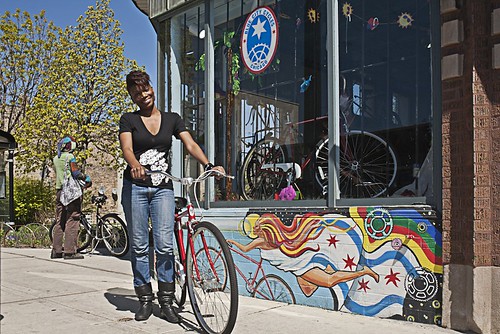The League of American Bicyclists, one of the nation’s leading advocacy organizations, has come a long way. Founded in 1880 as the League of American Wheelman, the group passed a resolution in 1894 barring people of color from joining, including up-and-coming African-American racing champ Major Taylor. In 1999, after it was discovered there were no records the ban had ever been revoked, the league officially disavowed the resolution, repealed the ban and committed to building a membership that reflects America’s population.
The league is shifting that effort into high gear with the creation of the national Equity Advisory Council, a panel of ten advocates and experts on promoting bicycling in diverse communities. The new team will brainstorm ways to make the cycling movement more inclusive and get more people on bikes.
“The League aims to be the voice for everyone who rides a bike in the U.S., but we recognize that many important voices are still missing from our membership and leadership,” explains the announcement on the league’s website. “Not only are women, youth and people of color underrepresented in policy discussions that impact their neighborhood health and economic development; they are also missing in many bicycle advocacy discussions — particularly at the national level.”
The panel includes members from a wide range of backgrounds and fields, from cities ranging from Portland, Oregon, to Miami. Among them are Adonia E. Lugo of Los Angeles, co-founder of the CicLAvia car-free streets event and City of Lights/Ciudad de Luces, a nonprofit which seeks to empower low-income cyclists of color; Brian Drayton, the director of Richmond Spokes, which teaches young people bike safety and repair as a means to foster health, life skills and entrepreneurship; and Sara Pelerin, 18, an intern with New York’s Recycle-A-Bicycle community bike shops who makes bicycle jewelry and is helping to organize the 2013 Youth Bike Summit.
Chicago is ably represented by Eboni Hawkins, founder of the local chapter of Red Bike and Green, a national organization which promotes cycling in African-American communities as a means to achieve wellness, economic self-reliance, and environmental sustainability. I caught up with Eboni by phone to get her thoughts on the new endeavor.
John Greenfield: What do you think was the motivation behind forming the Equity Advisory Council?
Eboni Hawkins: The league is basically taking a proactive approach, recognizing that unless there is actually work done to form these councils and committees, then oftentimes these voices won’t get heard, and older white men in Spandex may continue to dominate the conversation in cycling. So this is a way to make sure that as many voices are heard as possible.
The league is hoping that by pulling this group together not only can we share best practices and create more of a national conversation on equity but also shape how that conversation moves forward. Since it is a year commitment there’s definitely going to be that passing on of the torch to whoever the new council members may be next year.
JG: How did you get involved?
EH: There was a nomination process. Red Bike and Green, as a national organization, recently became a member of the league, and then I was nominated to serve on the council by Hamzat Sani, who’s the equity and outreach fellow at the league. It was a mix of trying to have geographic representation, racial representation, and gender representation on this council.
JG: What aspects of the advisory council are you most excited about and what do you think you guys can accomplish with this?
EH: I’m really interested in the knowledge share. I think that one of the things that has been a little challenging for me is the fact that with Red Bike and Green, out of the three chapters, I’m working in the largest city. So there’s a lot more for me to consider here than there is in Oakland or Atlanta in terms of organizing work and outreach. Additionally I’m new to advocacy work and some of the other people on this council have been doing this work for years. So I’m very interested in the sharing of best practices. It’s going to be great because then you don’t have to reinvent the wheel, there’s a possibility of using kind of an open-source format or programming or curriculum.
Another thing the league can accomplish is raising awareness that there are issues that are particular to various communities and that these are voices that need to be brought to the table in our local politics, in the conversation around [bike] infrastructure. So it’s great to have a group of people who are doing advocacy as well as hands-on work.




